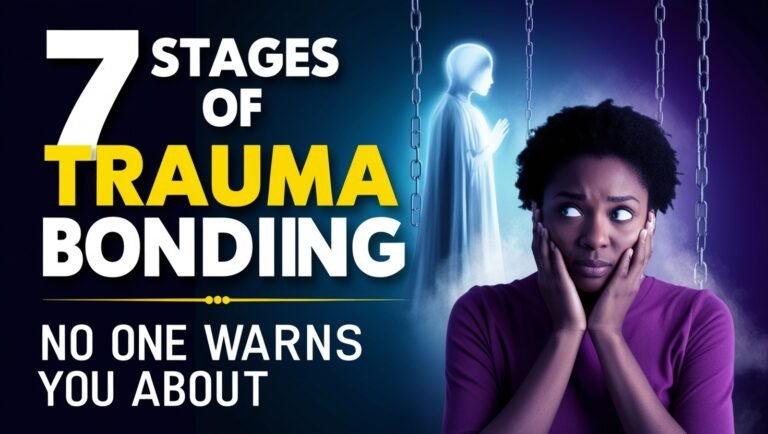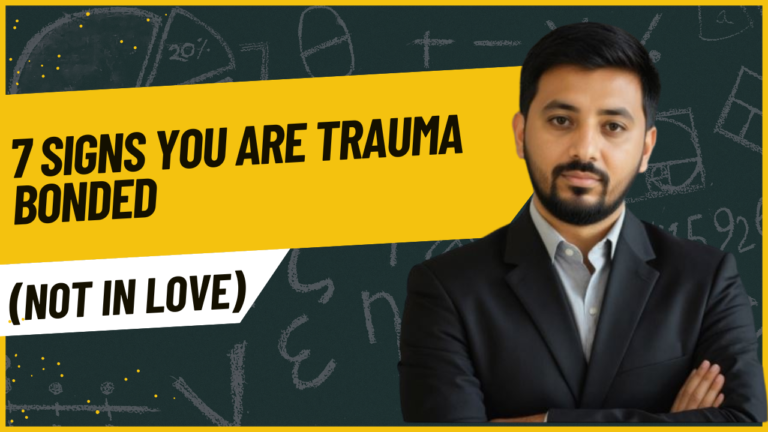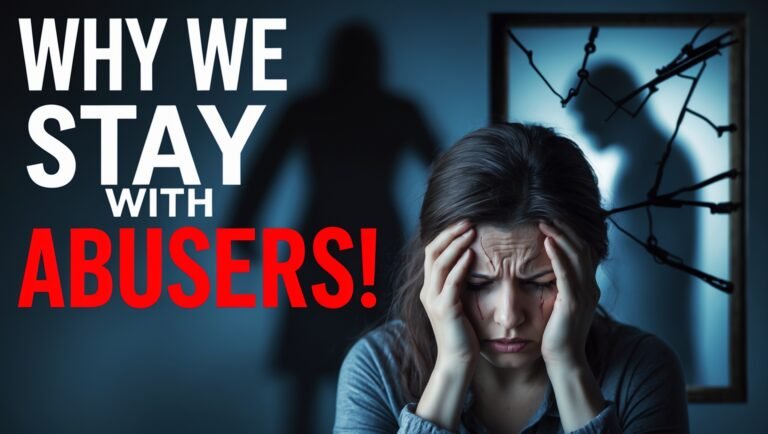Why Every Fight Feels Like a Breakup
Let’s talk about that moment. You know the one.
Your person’s tone shifts slightly during a conversation about what to order for dinner. Maybe they take a beat too long to respond to your text. Or they say they “need space” after a minor disagreement about whose turn it was to do laundry.
And suddenly? Your whole body’s on fire. Heart racing. Hands shaking. Brain screaming: “This is it. They’re leaving. Everyone leaves. Pack your bags before they can pack theirs.”
Welcome to the abandonment trauma club. Population: way more of us than you think.
The Abandonment Playlist: Greatest Hits Edition
Here’s what nobody tells you about loving with abandonment trauma: it’s like your brain’s constantly playing a greatest hits album of “Everyone Who Ever Left: The Remix.” And that shit’s on repeat, 24/7.
Track 1: The Self-Fulfilling Prophecy
You start pulling away first because hey, if they’re gonna leave anyway, might as well beat them to it. Classic defense mechanism, bestie. Spoiler alert: This is how we accidentally push away the ones actually trying to stay.
Track 2: The Evidence Collection
Your brain becomes a professional detective, gathering evidence for a case nobody asked for. They didn’t use an emoji in their last text? Exhibit A. They wanted to hang with friends instead of you? Exhibit B. They took a nap without telling you? Better call the whole damn legal team.
Track 3: The Preemptive Strike
You pick fights over nothing because at least then you know why they’re mad. It’s better than that awful waiting, right? Wrong. But trauma brain doesn’t care about logic.
Track 4: The Perfect Partner Performance
Morphing yourself into whatever you think they want. Suppressing your needs, your opinions, your whole damn personality because being yourself feels too risky. Plot twist: This is exactly how you lose yourself while trying to keep someone else.
Track 5: The Push-Pull Marathon
Testing their commitment like it’s an Olympic sport. Pushing them away to see if they’ll chase you, then panicking when they actually give you space. It’s exhausting for everyone involved, but your trauma brain thinks it’s collecting data.
Why Your “Crazy” Isn’t Actually Crazy
Let’s break this down real quick: Your reactions aren’t coming out of nowhere. Your brain learned these responses somewhere. Someone (or multiple someones) taught you that love equals leaving. That people only stay until something better comes along. That you’re somehow fundamentally too much or not enough.
And now your nervous system’s stuck on high alert like a security guard who never sleeps. Every slight change in tone, every delayed response, every minor criticism becomes a potential threat. Your body’s running evacuation drills before there’s even smoke.
The Real Talk Nobody’s Having
Here’s what the therapy TikToks and Instagram infographics aren’t telling you:
Recovery isn’t linear. Sometimes you’re fine for weeks and then boom – back to checking their location at 3 AM because they didn’t say “I love you” in their usual tone.
Those “toxic” behaviors everyone talks about? They’re often just trauma responses in party dresses. Your clingy isn’t crazy – it’s your inner child death-gripping the one good thing they’ve found.
The constant need for reassurance? It’s not attention-seeking. It’s your brain trying to build a safety net out of “I love yous” and “I’m not leaving.”
And let’s talk about the anxiety attacks that hit out of nowhere. When you’re having a perfectly good day and suddenly your brain decides to play “What If They Leave?” on repeat. That’s not you being dramatic – that’s your nervous system running old survival programs.
The Plot Twist: Healing While Human
Here’s the thing about healing from abandonment trauma: You don’t have to be perfect at it. You just have to be willing to catch yourself mid-spiral and try something different.
Some real talk on what actually helps:
Name Your Trauma
Voice Start calling out your abandonment trauma like it’s that one dramatic friend who always assumes the worst. “Oh, here’s Trauma Tina again, thinking he’s ghosting when he’s been gone for 30 minutes.”
Build Your Evidence File
Start collecting proof that contradicts your fears. Screenshot those good morning texts. Save those random “thinking of you” messages. Document every time they choose to stay after a fight. Build your case against abandonment trauma’s lies.
Learn Your Triggers
Map out what sets off your abandonment alarm system. Is it tone changes? Unanswered texts? The dreaded “we need to talk”? Knowledge is power, bestie. When you know your triggers, you can start separating what’s real threat from what’s old trauma.
Communicate (Even When It’s Terrifying)
Try “Hey, my abandonment trauma’s acting up. Can you just remind me we’re okay?” Sometimes naming the beast takes away its power. And the right person? They’ll get it. They’ll show up for these conversations.
The Revolutionary Act of Staying
Here’s what nobody tells you about healing from abandonment trauma: The biggest victory isn’t in never feeling afraid. It’s in feeling all that fear and choosing to stay anyway.
It’s in letting someone see your mess – your 3 AM anxiety spirals, your need for constant reassurance, your panic when they’re not texting back – and them choosing to stay too.
It’s in learning that some people actually mean what they say. That “I love you” can be a promise, not just words people use until they don’t.
The Next Chapter: Your Love Story 2.0
Imagine being able to:
- Have a disagreement without packing mental bags
- Let them have space without assuming it’s goodbye
- Trust that “I love you” doesn’t come with an expiration date
- Feel secure even when they’re not constantly proving their love
- Be yourself without fear of being too much or not enough
- Stay present in the moment instead of constantly scanning for threats
- Believe someone when they say they want to stay
It’s possible. Not in a toxic positivity, “just heal bro” kind of way. But in a real, messy, human way. With setbacks and progress and everything in between.
Your Future Self Thanks You
To everyone reading this with a heart that’s been trained to expect goodbye: Your trauma isn’t your fault, but healing is your responsibility. Not everyone is your past. Not every fight is the end. You’re not too much. You’re not unlovable. You’re just healing.
And to the ones loving us through this: Thank you for staying when our trauma tells us you won’t. Thank you for proving that love doesn’t always mean leaving. Thank you for being patient while we learn to trust again. Thank you for seeing past our protective walls to the love underneath. Thank you for teaching us that some people actually stay.
The Truth About Healing
Here’s the raw truth about healing from abandonment trauma: It’s not about never feeling afraid again. It’s about learning to sit with that fear without letting it drive the car.
It’s about building a new relationship with trust – not blind faith, but conscious choice. It’s about learning that you can survive someone leaving, which paradoxically makes it easier to let people stay.
Most importantly? It’s about rewriting your worth. Because you deserve someone who doesn’t make you feel like love has an expiration date. You deserve someone who stays not because you’re perfect, but because they choose you – messy healing and all.
Drop a ❤️ if this hit home. Share if you know someone who needs to hear this. Comment your story below – because healing happens in community, and your story might be someone else’s survival guide.
Remember: Your trauma responses were once your survival skills. But you’re safe now. It’s okay to put down the armor. Time to write a new love story. One where staying feels safer than running.
Subscribe my newsletter to get blog post directly in your mailbox.






